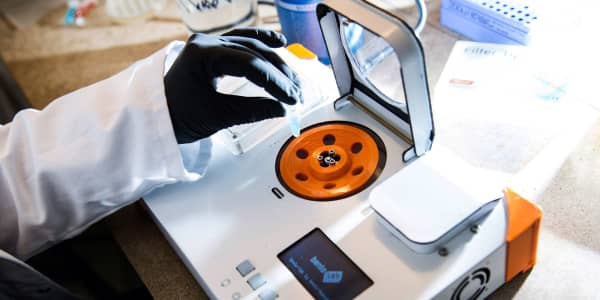
Scientists are one step closer in harnessing the power of whole-genome sequencing to solve the mysteries of autism spectrum disorder (ASD), a condition that is affecting more than 3 million individuals in the United States and costing our economy an estimated $268 billion annually. In April the advocacy organization Autism Speaks announced that its project to create the world's largest genomic database on autism is more than halfway complete.
Known as MSSNG and pronounced "missing," in reference to the many unanswered questions about the disorder, the project calls for sequencing the DNA of 10,000 families where one or more members is affected by autism. It is an open-source research project, meaning that any qualified researcher anywhere in the world can access the data, which was developed in conjunction with Google and Sick Kids Hospital in Toronto.
The internet giant is housing research data in an open cloud database, allowing scientists worldwide to mine the massive amount of data on the genome and collaborate and share their findings.
The timing of this initiative is critical, considering that the national economic cost of autism — including direct medical, direct non-medical and productivity costs — is skyrocketing. That number is expected to rise to $461 billion by 2025, according to a study funded in part by Autism Speaks.
Since it began last year, MSSNG has sequenced the genomes of more than 5,000 individuals affected by autism, which is characterized by irregularity in brain development, in varying degrees, by social, communication and behavioral challenges.
It may take years to fully unlock the many pieces of the autism puzzle. But scientists have already begun to identify subtypes of ASD associated with health problems, such as seizures, gastrointestinal issues and schizophrenia. The hope is that genetic mapping will one day revolutionize treatment of ASD through personalized medicine tailored to the individual.
That prospect "is something that has us all pretty excited," said Mat Pletcher, interim chief science officer and head of Genomic Discovery for Autism Speaks, who represented the MSSNG Project at a recent White House summit on precision medicine. "There's still so much we don't know about autism. But our hope is that genome mapping will soon allow us to improve the lives of people affected by autism based on what their genome tells us."
That's heartening news for Jesse Mojica and his wife, Ana, whose son Adam was diagnosed with autism at age 2. "Adam was always a very happy little boy with a brilliant smile, a joyful little boy," said Jesse. "We first knew something was wrong when the sparkle in his eye started to go away. He had a few words but lost those words and never regained them."
Jesse said Adam, now 17, has grown into a remarkable young man, despite having always lived in a world to which he must struggle to adapt. "He loves his family, and he loves music, which is one of his greatest joys. For us the MSSNG initiative is all about finding answers — answers to how we can help Adam, how can we support him and continue to make life better for him. We want to open the window into Adam's world."
By identifying genetic targets, we may one day be able to help people on the autism spectrum do a lot better.Dr. Stephen Schererdirector, Centre for Applied Genomics, Toronto's Hospital for Sick Children
Data for the MSSNG project comes from individuals and families who participate in genetic research studies at autism centers around the country, such as Children's Hospital of Philadelphia and Vanderbilt University Medical School. Each participant is administered a simple blood test, and the DNA is sent to a sequencing company for processing. The processed data is stored in the Google Cloud platform, which can be accessed by qualified researchers.
In the future, Autism Speaks plans to build a community portal where test subjects can access the data as well. "Families will be able to see their own genetic information by simply logging on to the portal," said Pletcher. As more treatments become available, they'll be able to share the genetic data for use by their private physicians.
Creating precision medicine treatments for autism may well be a complex process, however. The first set of data from the MSSNG scientists revealed just how heterogeneous the disorder is. A team led by Dr. Stephen Scherer, director of the Centre for Applied Genomics at Toronto's Hospital for Sick Children, sequenced 340 whole genomes from 85 families. Each family had two children with an autism spectrum disorder. The data showed that even though autism often runs in families, most siblings who have autism spectrum disorder have different autism-linked genes.
The findings flew in the face of conventional wisdom that most siblings with the disorder inherit the same autism-linked genes from their parents. Rather, the researchers found that the siblings shared the same autism-predisposing gene changes only 31 percent of the time.

Scherer said the study points to the likelihood that autism is not one disorder but many. "We should be saying autisms, not autism," he said. "Every person with autism is like a snowflake — one of a kind."
The one-of-a-kind nature of autism is part of what makes it so hard to treat. In addition to the core features of the disorder, many with autism spectrum disorders suffer from co-occurring health problems, such as seizures, gastrointestinal issues, ADHD and depression and anxiety.
While medicines to treat the core features of autism may be a long time in the making, it's believed that genome mapping could make treatments available sooner for these attendant problems.
For example, a 2014 study published in the journal "Cell" reported that a mutation in a gene known as CHD8 is linked to a subtype of autism associated with an increased risk of certain health problems.
The study, conducted by researchers at 13 institutions and led by Raphael Bernier of the Autism Center at Seattle Children's Hospital, examined data from 6,176 individuals with ASDs. It found that 15 of those carried the CHD8 mutation. Those who carried the variant were more likely to have distinct facial features, such as a broad forehead and wide-set eyes, as well as gastrointestinal problems, such as severe constipation, and disturbed sleep. Subsequent studies have shown that CHD8 mutations are also linked to seizure disorders and schizophrenia.
It's not yet known what autism-associated mutations are also linked to ADHD and mental health conditions. But some experts believe that the identification of autism subtypes may lead to the development of medications that treat these conditions as well. "By identifying genetic targets, we may one day be able to help people on the autism spectrum do a lot better," said Scherer.
— By Annetta Miller, special to CNBC.com




